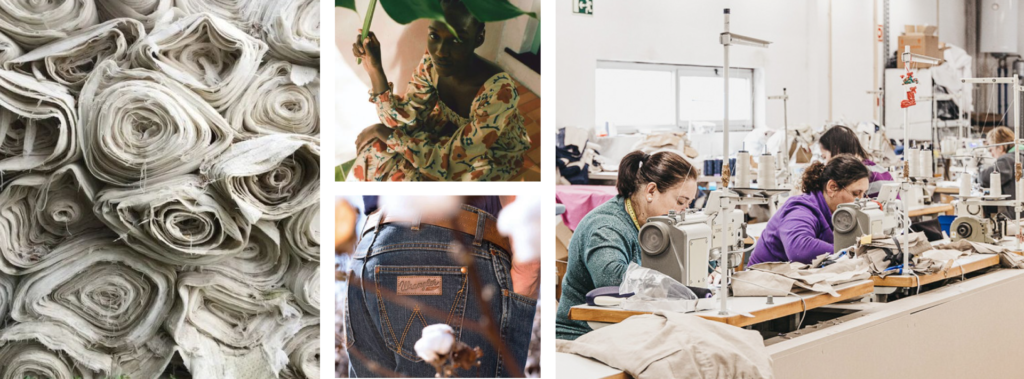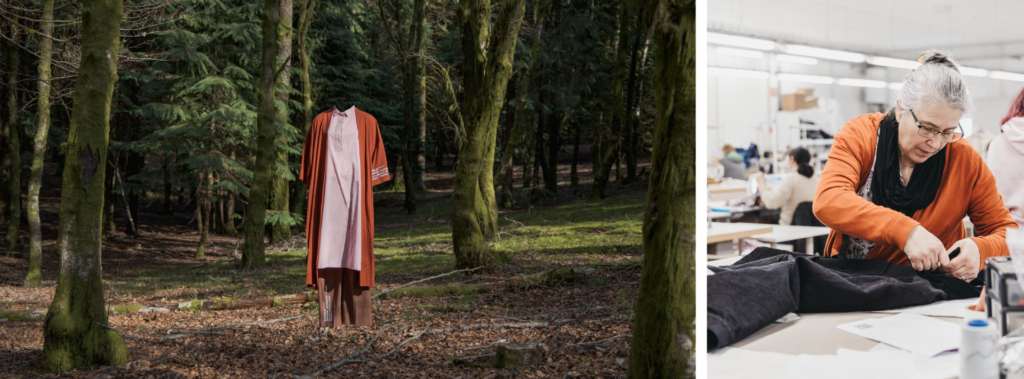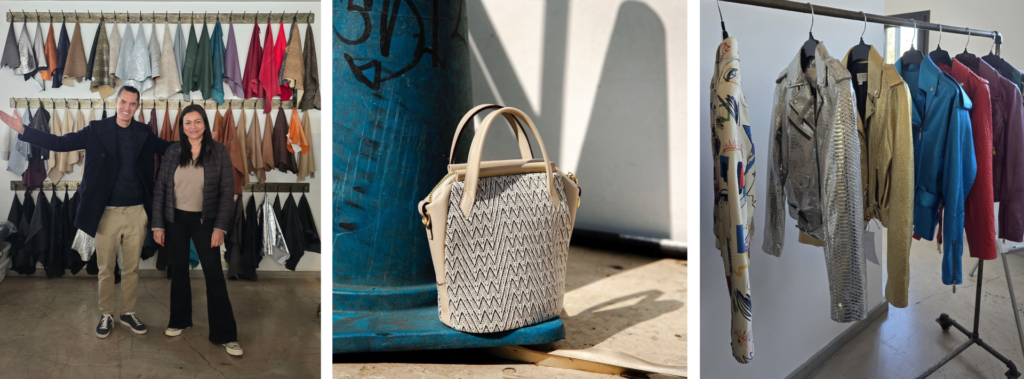The devastating fire that ravaged Ghana’s Kantamanto Market on January 2, 2025 was a stark reminder of the consequences of fast fashion’s endless cycle. While this tragedy stands as a reminder of the system’s flaws, it’s important to recognize that no other incident of this scale has occurred so far. However, if we continue on our current trajectory that isn’t meeting sustainability targets, each fire, flood, and disaster linked to the fast fashion industry will become even harder to contain.
Fast fashion’s impact is felt globally, from labor exploitation to environmental destruction. Take Ghana as an example. Each week, an estimated 15 million items of discarded clothing flood the market, much of it sent from the Global North. These garments, often referred to as obroni wawu (or “dead white man’s clothes”), have become an overwhelming burden for the local economy, environment, and society. The flood of textiles represents the deep flaws in the global fashion supply chain, where a cycle of overproduction and overconsumption leaves countries like Ghana to deal with the waste and its repercussions.

Despite decades of awareness—ranging from the rise of environmental movements in the 1970s to the tragic collapse of Rana Plaza in 2013—the fashion industry continues to operate on unsustainable principles, contributing to global waste, labor exploitation, and environmental destruction. The industry’s reliance on fast fashion is one of its most damaging features, and the influx of discarded garments into markets like Kantamanto only underscores the injustices that have yet to be addressed.
At Deepwear, we are committed to sustainability through every part of the supply chain, rejecting greenwashing and embracing real change. Here, we’ll explore the continued evolution of sustainable fashion, how we vet our manufacturing partners, and why the future of fashion depends on adopting responsible practices that respect both people and the planet.
The Unchecked Growth of Fast Fashion: From Boom to Crisis
The origins of fast fashion in the 1990s marked the beginning of a worldwide race toward cheaper, faster, and more disposable clothing. The major fast-fashion brands have changed the game by manufacturing and delivering new styles at a breakneck pace, cutting costs and labor standards along the way. This model further exploded in the last 25 years, pushing prices down and producing massive amounts of waste, while consumers rapidly consumed and discarded clothing. However, it’s also crucial to note that many mid-range or “high-end” brands that are often marketed as more accessible luxury – think household names with a middle-to-high price point – are not immune to this issue. While these brands may offer a luxe feel, they are still fast fashion, and are often produced in countries with lax labor laws, leading to exploitation, poor working conditions, and damage to workers’ rights, including the rights of children. Despite their market appeal, these brands are no different in their impact when it comes to sustainability.

The true cost of this system is borne disproportionately by countries with minimal means to counteract its impact. For instance, in Ghana’s Kantamanto Market, an estimated 15 million items of discarded clothing flood the market weekly, overwhelming local economies and ecosystems. Obroni wawu is seen not as a blessing, but a burden. These discarded garments are often too worn or of low quality to be sold or reused, leaving local markets overrun with unsellable textiles. Worse yet, the unsorted clothes accumulate and create a mounting waste problem that leads to pollution, local health hazards, and environmental degradation. This is the hidden cost of fast fashion, which pushes the consequences of overconsumption to regions that have no part in its production.
In Bangladesh and other garment-producing countries, the problem runs even deeper. Large brands, wielding significant economic leverage, negotiate rock-bottom prices that force factory owners to cut corners—compromising workers’ wages and conditions. It’s a flawed system that perpetuates a modern form of economic colonization, where the wealthiest nations dictate terms that disadvantage poorer countries. No factory owner wants to pay low wages, but they are often left with no choice when competing for survival.
This cycle impacts children most severely. In extremely impoverished contexts, where education is inaccessible, factory work might be seen as the lesser of two evils—an alternative to far worse fates like trafficking or exploitation. While this reality highlights the urgent need for systemic change, it also demands a delicate balance: ensuring children are protected from labor while addressing the root causes of poverty that force them into such positions. A sustainable system would provide families with fair wages, enabling them to send their children to school rather than work.

The Egoism of the West and the Role of Monopolies
Protecting children from labor requires addressing these root causes, not just pointing fingers at developing countries. The West’s egoistic mentality fuels this problem. By maintaining systems that prioritize the profits of big brands over equitable trade, wealthy nations protect the monopolies that perpetuate exploitation. Large corporations dominate global markets, squeezing out smaller businesses and killing local economies – even in their own countries.
For example, independent shops in Western nations are vanishing because they cannot compete with the artificially low prices set by major fast fashion retailers. Supermarkets and large brands have taken over, leaving smaller businesses to die out. This monopolistic behavior doesn’t just harm developing countries – it damages economies everywhere. Monopoly kills the economy, leaving even Western consumers with fewer options and lower-quality goods.

Greenwashing: More Damage, Less Change
The term “greenwashing” describes the deceptive practice of marketing products as environmentally friendly when, in reality, they are not. Greenwashing is rampant in the fashion industry, where brands often tout sustainability credentials without backing them up with real action. This problem is compounded by the fact that sustainability has become a buzzword, an easy way for companies to improve their image without making significant changes to their practices.
At Deepwear, we take a strict stance against greenwashing. We reject the fast fashion model and its devastating consequences. We choose to work with small-to-medium-sized brands – companies that prioritize human values over mass production. By collaborating with smaller factories, we create space for better wages, safer working conditions, and a more humane pace of work.
We believe that true sustainability requires more than just clever marketing—it requires real investment in ethical production, transparent supply chains, and long-term responsibility. Our partners are carefully vetted through a rigorous process that prioritizes ethical labor practices, environmental impact, and transparency. We work closely with our factories to ensure that their operations meet the highest standards of responsibility and sustainability. We believe that companies should never grow so large that they abuse their power. A company that becomes too big inevitably loses touch with the people at the heart of its operations. By staying within a more human framework, we ensure that our practices reflect respect – for workers, communities, and the environment. We understand the reality of this industry, and we know that real change requires collective responsibility. Fashion should not come at the expense of people or the planet.
Deepwear’s Approach: Ethical Manufacturing for the Future of Fashion
Our commitment to sustainable luxury begins with an in-depth evaluation of every factory and supplier we work with. We ensure that each partner follows fair labor practices, uses eco-friendly materials, and implements processes that minimize waste. Here’s how we make it happen:
- Fair Labor Practices: We ensure that our partners provide fair wages, safe working conditions, and respect for workers’ rights. We also conduct regular audits to ensure compliance with international labor standards, and we only work with factories that are free from exploitative labor practices like child and forced labor.
- Eco-Conscious Materials and Production: We prioritize the use of sustainable, organic, and biodegradable materials in our production processes. The factories we work with are committed to reducing water usage, cutting carbon emissions, and minimizing waste. We also favor closed-loop systems where possible, allowing garments to be recycled at the end of their life cycle.
- Supply Chain Transparency: Transparency is crucial in ensuring that every step of the manufacturing process is traceable. We ensure that all of our sourcing is documented, allowing us—and our clients—to see exactly where and how their products are made.
- Innovative Sustainable Designs: We encourage our brands to embrace timeless designs, which ensure longevity in the product lifecycle. By prioritizing quality over quantity, we reduce the need for constant production and consumption cycles. Additionally, upcycling and recycling are integral to our approach, offering creative solutions to extend the life of garments and minimize waste. We actively support initiatives that repurpose existing materials into new designs, proving that sustainability is not only practical but a matter of creative innovation. For more on this topic, check out our blog: Recycling vs. Upcycling: A Guide for Brands to Make Sustainable Fashion Choices!

The Inequity of Fashion Waste
The textile waste crisis in Ghana and other countries in the Global South represents a significant inequity in global trade and waste management. While the Global North consumes clothing at unsustainable rates, countries like Ghana are left to handle the aftermath of this wasteful system. This form of waste dumping is not only environmentally harmful, but it perpetuates an unjust global system where the poorest nations bear the burden of the wealthiest ones’ overconsumption.
It’s a question of fairness: why should countries with minimal responsibility for the production of fast fashion be forced to deal with the consequences of overproduction and waste from wealthier nations? This systemic imbalance is a central issue in the global sustainability debate. And while some may argue that the waste sent to countries like Ghana is “donated,” the reality is far more complex. The garments are often poorly made, rendering them unsuitable for reuse or resale. Instead, they create a mountain of waste that becomes difficult, if not impossible, to manage.
A Path Toward Equity
Systemic change requires more than just awareness – it demands action. Simple reforms, like enforcing minimum import price standards, could have a transformative impact. For instance, a country could introduce a law requiring a minimum declared value of €12 for each imported t-shirt, and such a policy would prevent brands from exploiting low-wage labor and dumping cheap goods into global markets. One law could ripple through the Western world, reshaping the fast fashion industry – but so far, these changes have been avoided.
Why? Because protecting big companies has taken precedence over protecting workers. Governments know what they can do to address this exploitation, yet they choose not to. It’s easier to point fingers at poorer nations, portraying them as the problem, while ignoring the systemic issues that perpetuate exploitation.
Investing in Timeless, Responsible Fashion
Despite the overwhelming challenges facing the fashion industry, we believe in the potential for meaningful change. Sustainable luxury is not just about producing items that look good; it’s about creating products that are built to last, crafted from ethical materials, and produced in ways that respect both people and the planet.
At Deepwear, we see sustainability as an investment in the future of fashion. This is why we focus on working with designers and brands who value transparency, responsibility, and long-term solutions over short-term gains. The fashion industry has faced numerous “wake-up calls,” but we believe that it’s time for those in the industry to stop waiting for a tragedy to spark change and instead take deliberate, responsible steps toward sustainability.
We know that real change won’t happen overnight. The fashion industry is complex, and its supply chain is global and deeply embedded in both economic systems and consumer habits. But through collaboration, innovation, and a commitment to transparency and accountability, we can collectively shape a future for fashion that is responsible, ethical, and, most importantly, sustainable.
Conclusion: A New Era for Fashion
As the fashion industry continues to grapple with its environmental and social impact, the demand for sustainable and ethical practices is only growing. Whether it’s rejecting the practices of greenwashing or supporting responsible manufacturing, every step we take toward a more sustainable fashion future matters. At Deepwear, we are dedicated to making sustainable luxury the true investment it was always meant to be—one that honors the craft, the people, and the planet.